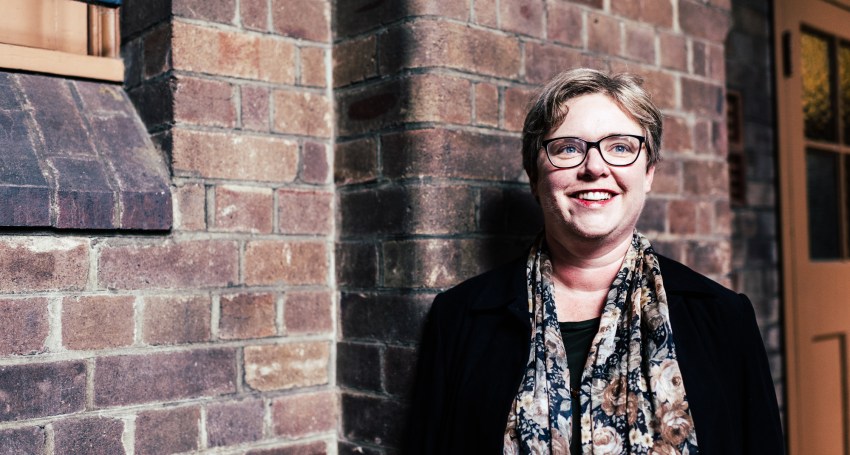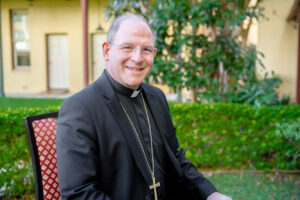Evolution not revolution: Synod briefing
International
The role of women in the Church, potential revisions to Canon Law and the importance of lay ministries were among the topics discussed at a Synod briefing featuring Australian delegates.

As the historic Synod on Synodality continues in Rome, daily briefings have been held to provide the public with updates on round table discussions taking place on a wide range of issues since October 4.
Dr Paolo Ruffini, president of the General Assembly’s Commission for Information, was joined at the briefing on October 17 by the Archbishop of Rabat, Cristobal Cardinal Lopéz Romero; Bishop Anthony Randazzo, Bishop of Broken Bay, Australia, and president of the Federation of Catholic Bishops’ Conferences of Oceania; and renowned theologians Professor Renée Köhler-Ryan from Australia and Nigerian Jesuit Agbonkhianmeghe Emmanuel Orobator.

Giovanni Portelli Photography © 2022
Bishop Randazzo said synodality was “not something that is born in a vacuum” but is how Catholics “live our faith and how we proclaim the Gospel in every single moment of our day”.
Referring to a proposal put forward at the Synod to replace the word “co-operation” in Canon Law with “co-responsibility”, he said the modification was not a revolution, but an evolution.
“The law itself, of course, can change when the needs of the Church that it has been prepared for change,” said Bishop Randazzo, who is a canon lawyer.
Advertisement
He also said some aspects of the law “can be adapted according to the needs of particular communities and situations and circumstances”.
On the subject of a female diaconate and the role of women, Dr Ruffini said participants of the General Assembly discussed the possibility of opening the diaconate to women, first clarifying “the very nature of the diaconate”.
He said that “it was recalled that Jesus associated women with His retinue” and “the question was raised whether it might not be possible to envisage that women, who gave the first proclamation of the Resurrection, might not also give homilies”.
“It was also said that when women are present in pastoral councils, decisions are more practical and communities more creative,” Dr Ruffini continued. He quoted a saying cited in the hall: “When you want something to be talked about, have an assembly of men, but if you want to do something, have an assembly of women”.
However, he said although the role of women in the Church was a central focus of the discussion, it was not only one or the most dominant, just as the issue of women’s priesthood had not been predominant so far.
Advertisement
Professor Köhler-Ryan described such questions as something of a “niche issue” that do not necessarily reflect the real needs of women today.
“I think that there’s too much emphasis placed on this question [of the ordination of women to the priesthood],” she said.
“And what happens when we place too much emphasis on this question is that we forget about what women, for the most part, need throughout the world,” including housing, food, clothing and a future for their children.
“I want them to have a future, and a future where they are welcomed into the Church, and everyone they know and love is welcomed into the Church.”
The reports of the working groups and of the individual interventions also focused on other issues: the importance of the parish which is “not a service station but a place of communion” and of the community; lay ministries which “are not stopgaps for the lack of priests” and “should not be clericalised”; and on the service performed by priests, whom the community of the baptised cannot do without.
Professor Köhler-Ryan described the Synod as a “very exciting” moment for the life of the Church.
“I think that what is happening right now at this Synod is that we have the opportunity as a universal Church to hear from very many different voices and that emphasis on listening together in a prayerful way has been very important,” she said.
“The involvement of the laity is one of the most significant points about this Synod.”
Professor Köhler-Ryan said the Synod is “a tremendous opportunity to have a sense of where we are as the universal Church, and to have a sense of how it is that in some ways we are very, very much the same across the whole world”.
“We have universal teaching, and we’re really trying in many different ways to reach out to those who might not know about Christ and His Mother and our Church,” she said.
And we try to do this in various ways, she continued, including through digital technologies, while recognising that there are populations that still do not have access to them.
Bishop Randazzo latched onto the theme: “When we talk about digital communication and the synodality of the digital world we’ve got to remember that there might be an island that a ship goes past occasionally with some fuel. If the ship doesn’t arrive, they have no fuel, their generators don’t work, they can’t plug in a computer if they have one, they are isolated.”
He urged people not to look at things “in a European way”, that is, to take it for granted that everyone has taxis and trains to get from one place to another or, for example, to go to the parish. We speak of communities even in the same region that might be a thousand kilometres apart, he said.
“One of the really wonderful experiences that I’m having at the Synod is sitting at table and also sharing the occasional coffee with people who come from all over the world, who are not just from Europe, who don’t just come from the traditional European communities of the Church,” Bishop Randazzo said.
“It sounds very synodal to me,” he said. “And I think one of the geniuses of the Holy Father, Pope Francis, is that this is not something that is born in a vacuum.”
Fr Orobator agreed with Bishop Randazzo, joking that this Church event is one of the things theologians “live for”, namely to be part of a process from which to draw resources. “I remain convinced that the process is probably going to be more important than the outcome,” he said.
“I believe that this is the kind of framework and mechanism that would lead us as a community called Church to experience a new way of being in, where people, no matter who they are, no matter their status or station or situation in the Church, are able to be part of a process where they are not only heard, but they are also able to contribute to a process of discernment,” he said.
At the same time, he bore witness to “the diversity of the Church and to draw from the wisdom that is so embedded in this diversity, to draw from the insights and the unique gifts that this diversity offers the Church.”
Dr Ruffino stressed that the Synod was not designed to answer the questions of one journalist or another, but was “designed for a discernment of the Church that stems from a process”.
It concerns discernment “on how the Church can walk in the world.”
A journalist in the room underlined the fact that some issues – first and foremost women and the reception of LGBT+ people – were not to be classified as merely journalistic constructions, but issues that were close to the hearts of many believing people who have “invested” time and energy during the consultative phase of the synodal process precisely in order to have a serious reflection on these topics.
The journalist said people were now waiting for answers.
In this regard, Dr Ruffini made it clear that these issues “are the subject of conversation”. He said the Synod is certainly not just “a round table” and certainly not “a talk show”, but “a conversation in the Spirit.”
He noted that the General Assembly would produce “a synthesis report that will be sent back to the People of God and then there will be another Assembly.”
Cardinal Lopéz Romero said it was a long process that required “patience and hope”.
Source: Vatican News






